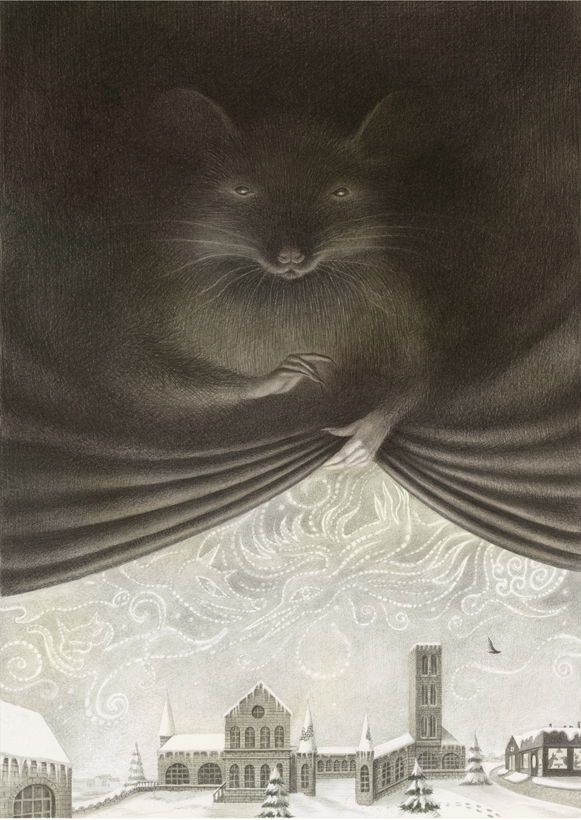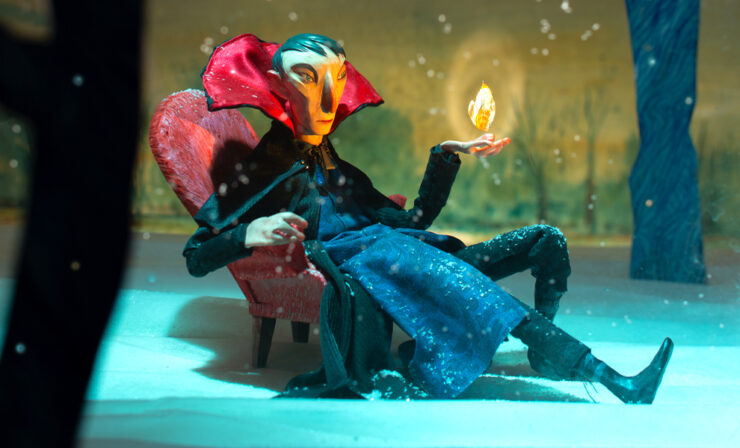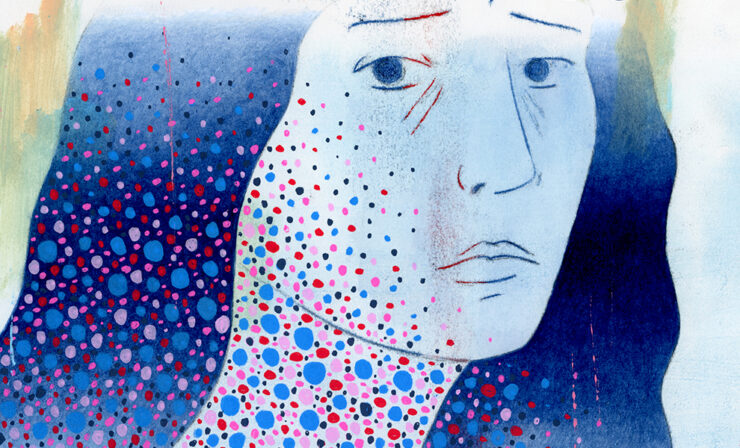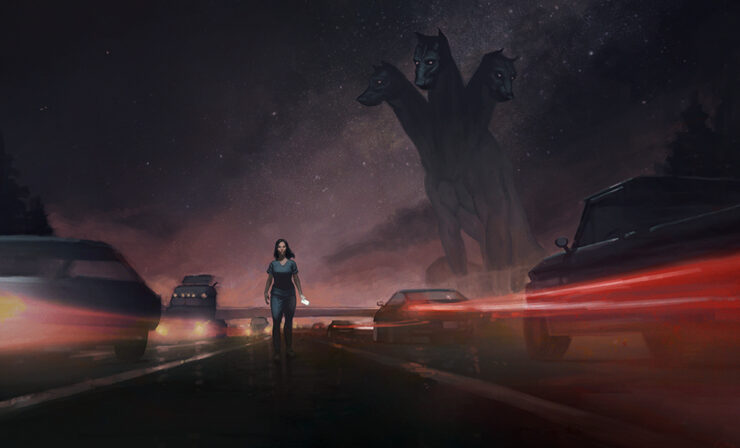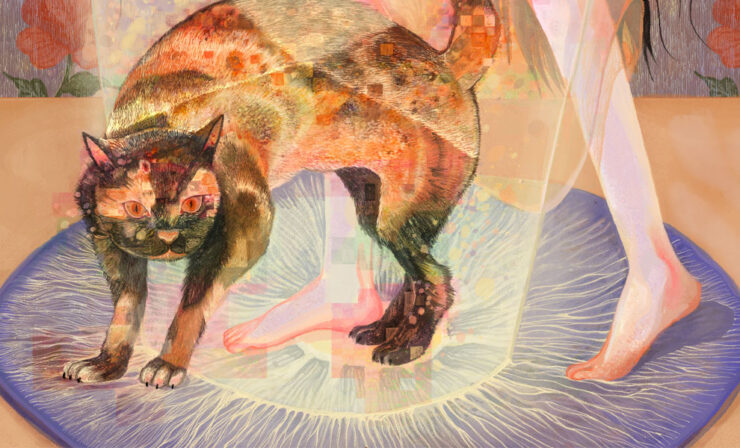A dog detective is hired by a female human to investigate a murder that she committed. But of course, all is not as it seems.
Before I take on an investigation for someone, I first make at least a cursory investigation of that someone. I did not adopt this practice out of any particular worries about the moral compass, or even in relation to my quite healthy sense of self-preservation. I investigate potential clients simply to avoid circumstances like this one, circumstances in which I wind up telling a story.
So I should have known. I should have well known. I knew about the learned mouse before I agreed to work for Professor Thomasina Swallow. I have no one to blame but myself.
Professor Swallow was a human woman, then aged forty-four years, on the faculty of the Rookery here in town. If that seems young for such a prestigious gig, then other factors of her biography will no doubt shock you even further, to wit: She was unmarried, her area of study was, and is, Second Empire military history, and when she was just sixteen and still a student herself at the Ladysmith Academy, she was adopted by the learned mouse, Coleridge.
As for me, these are my particulars: I am the private detective, Connolly Marsh. I am an investigative dog.
Professor Swallow found me at a bar in the Limestone Corridor—I don’t keep an office—and immediately made her intentions clear by settling down in the sawdust where I was enjoying a bit of rawhide and ruminating over a recently completed case.
“Mr. Marsh,” she said, “I want to engage your services.”
I looked up at her. “Is it on a matter of some delicacy? If so, I’ll need to refer you to someone else. I’m quite indelicate.”
The professor detached her pince-nez from her hilariously small nose, folded them over themselves, and deposited them inside a locket hanging from the gold chain around her neck. Then she sat back on her hindquarters, stuck her muddy boots out from skirts now liberally coated with flakes of pine, and bellowed, “I need a beer over here!”
The other people present, mostly humans with a scattering of others, including the drinking hole’s owner, a curious cat familiar with the city’s jails, briefly stopped their hubbub to take in the scene. Me, a well-known dog about town, giving the side-eye to a woman dressed like a scholar and acting like a stevedore.
“Make that two,” I said.
Buy the Book
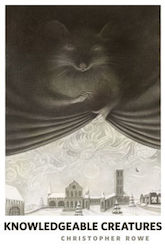

Knowledgeable Creatures
The gist was this: She had killed a man.
She didn’t lead with that. First there was some obfuscation.
“There’s a man where I work who is harassing me.”
Something for her bosses to settle, I told her.
It didn’t surprise me that a client would come to me with something like that. In addition to my investigative talents, I have a reputation—notice I don’t say that I enjoy a reputation—as something of a fixer. I’d leaned on people before.
She kept talking.
“This man is threatening to blackmail me.”
This was more interesting. Though my history with secrets both real and imagined was, to say the least, fraught, I rarely resisted opportunities to turn over stones and see what was crawling under the everyday. Back then, anyway. I nodded at her to continue.
“He came to my office this morning. Things . . . things got violent.”
I raised a paw to stop her. I’d just decided I probably didn’t want to hear any more.
“He’s dead,” she said.
“I’m going to stop you right there,” I said. The bartender was approaching with her pint glass and my bowl. It seemed best if nobody overheard whatever else she had to say.
After the bartender cleared out—and after I’d steeled myself with a couple laps of the house mild ale—I considered the risks, and I considered the length of my various tabs around town, including at the very bar we sat in. “I’m not saying I can help you and I’m not saying I can’t. Before I decide, I need to ask you two questions.”
She wiped some froth from her upper lip and nodded. That was good. That indicated she’d picked up on my feeling that this should be a quiet conversation.
“First,” I said, “was it an accident?”
“Oh, no,” she said. “Not at all.”
That was less good.
“Second,” I said, “was it self-defense?”
She thought about it for too long. Then she said, “Probably not in the way you mean.”
Man, I hate it when they try to be clever.
I stood up. “Do you have a card?” I asked.
She dug in a pocket sewn onto her skirt and pulled out a classy-looking piece of parchment, started to hand it over.
“Just show it to me,” I said. Humans. They think everyone has finely manipulating appendages. And pockets.
She held the card in front of my face and I memorized the particulars, especially her office address. “Is it safe for you to go back there?” I asked. “Can we meet at your office in, say, four hours?”
She thought too long again, then nodded hesitantly.
“The body is still in your office?” I asked, maybe a little too loud.
“I locked the door,” said the professor. “I put a note on the door telling the staff not to enter.”
I rolled my eyes. “Okay, we’ll see how well that goes. You stay here for at least half an hour. And don’t go back to your office until our meeting time, you got that?”
She was taking a long drink from her pint. “At least half an hour,” she said. “Agreed.”
Outside, I spied a couple of crows perched on a wire stretched between two of the courthouse towers. I barked to get their attention. They just jeered at me in response, then flapped away in the drizzle.
I cursed to myself. Crows were the only knowledgeable creatures who still had much to do with their forebears, and it was hard to tell the varieties apart. Those two had been of the antecedent type, not knowledgeable. Or if they had been knowledgeable, then they were rude as hell.
“What’s up, Mr. Investigator?” The voice was raspy and familiar. “Why are you cussing at my kin?”
I turned around to find Cool Charles strutting on the boardwalk behind me. He was small for a crow of any variety, but there was no doubting the gleam of intelligence in the beady black eye he had turned toward me.
“Your reputation would be better if you didn’t fraternize with that rabble, Charles,” I said.
He cawed, and I knew from past experience it was meant to be a laugh. “My reputation is irredeemable,” he said.
“Yeah,” I said. “That’s going around. Look, I need some information.”
Cool Charles hopped closer, clearly interested. Crows, man, they’re always interested.
I needed to cover some bases. One of them was making sure that I wasn’t walking into an open murder investigation. So, as was mandated by one of the court orders that I’m under, I stopped precisely one hundred feet from the entrance to police headquarters. None of the cops going in and out noticed me there in the little park across the street, and I was in kind of a hurry to talk to someone, so I threw my head back and started howling, which is something I’m pretty good at.
One of the older uniforms must have recognized me because nobody came over to stop my racket, at least not right away. After a few minutes, though, I saw a cheap suit I knew, wrapped around a portly human man like a too-tight sausage casing.
Of course they’d sent Henson. Who else besides my ex-partner would they send?
“You shouldn’t be here, Marsh,” he said. He was nervous, running his hand over his shiny, shaved skull.
“Just availing myself of my rights as a taxpayer,” I said. “Got a question for the civil servants who so gallantly protect our fair polis.”
He snorted. “You paid your taxes this year?”
He had me there. I honestly didn’t remember. I got to the point.
“Anybody caught a new body in the last couple of days, Henson?”
“What’s it to you?” he asked. At least he did me the courtesy of not claiming he couldn’t tell me. The broadest particulars of open felony investigations—such as the fact of their existence—are matters of public record. I had a lawyer friend who loved to file information requests on behalf of reporters and the odd investigative dog. Henson knew that. If he stalled me now, it would just mean more work for him later.
“I heard that you and the old team might be busier than usual is all,” I said. “Got a new client who’s interested in crime rates and so on. Has to do with people relocating, moving into town, that sort of thing.”
Henson looked incredulous. “You’re scouting for real estate agents? How the mighty have fallen. But no. Board’s clear. Has been for weeks.” He narrowed his eyes. “What’s really going on, Connolly?”
For a human, his instincts weren’t actually all that bad. We’d been a pretty good team before everything went to hell.
“Nothing much,” I said. “Scouting real estate, like you said. Kibble doesn’t pay for itself.”
I trotted away, leaving him in the park in a drizzle that was turning to snow.
“She’s a professor at the Rookery,” said Cool Charles.
“Tenured,” I said. “In the history department. I told you that.”
We were in a diner off the square that was somehow positioned so that its front windows were always in the shadow of one or another of the gigantic triumphalist monuments that dominate that neighborhood. I was up on a bench seat in the booth we’d been shown to. Charles was on the table, pecking at a plate of hominy.
He filled me in on the particulars he’d gleaned. Some of it was interesting, some of it wasn’t. Any of it might prove germane. I was making mental notes, building up a file on the chance I decided to take the case, waiting for the classic Cool Charles bomb to drop. He always held the most interesting thing back for as long as possible.
“Then there’s her family life,” Charles said.
I played along. “We’ve already covered that. Parents both dead, never married, no children.”
“Yeah, well, she has a sort of adoptive father. Her godfather, actually. Another scholar type.”
“Do tell,” I said. Luckily, Charles charges a flat rate, not by the hour.
“Name of Coleridge, like the poet. Named himself after the poet, in fact.”
Named himself? “He’s a knowledgeable creature?” I asked, like a sap, walking right into Charles’s setup.
Charles pointed his beak at the ceiling, swallowed, then turned me an eye. “Oh, yes. He’s a learned mouse.”
So, like I said, I should have known. I should have walked away right then. The blame is all on me.
All knowledgeable creatures are fascinated with learned mice to one degree or another. You could probably draw up a sliding scale labeled moderate interest on the healthy end and troublesome obsession on the end that has my picture on it.
It’s hard not be be fascinated with the creatures who made you.
Maybe made is too strong a word. Enabled your making might be a more accurate phrase. What cannot be denied is that it’s the alchemical processes developed by Isaac Newton and his partner Xerxes, the first publicly acknowledged learned mouse, which led to the so-called Flowering, the world-wide, centuries-long explosion of new knowledgeable creatures, from Nox, the first curious cat awoken by Newton and Xerxes, on down to every philosophical pig and argute crow today. On down to every investigative dog—including, of course, me.
Have learned mice been around forever? Did they awaken humans at some time in the distant past? Are they the secret governors of us all, operating independently of the Imperium, probably controlling it?
These really aren’t the kinds of questions you ask if you want to be taken seriously. They certainly aren’t the kinds of questions you ask if you want to stay a police officer.
I sniffed the spot where Professor Swallow claimed the body had been again. Nothing.
Well, not nothing. The threadbare old rug told all kinds of stories for those with the nose to smell them, but there was nothing among the litany of pencil shavings, dust, spilled Mayan takeout, or even the somewhat surprising champagne of a vintage considerably pricier than you would expect to have ever been uncorked in a junior history professor’s office—nothing in any of that to suggest that the body of a dead human male had ever lain on it. There wasn’t even anything to suggest that a live human male had ever lain on it.
I sighed.
“I suppose,” I said, “you’re going to have to tell me what happened.”
The professor was sitting on a couch mounded with old quilts, where I’d told her to park herself when we’d entered her office a few minutes before and found it corpse-free. She had the corner of one of these quilts in her hands, worrying at it.
“I don’t know what happened,” she said, not starting strong out of the gate. “Dr. Sedgewick was lying right here when I left to find you, and now he’s gone.”
“What happened before you came to find me,” I clarified. “All I know so far is that you believe you killed a man—a man named Sedgewick, apparently—and that instead of going to the authorities you came to me.” I knew a little more than that, but saw no reason to tell her so.
“You must think I’m trying to hire you to help me get away with murder, then,” she said.
“You don’t need me for that. There’s no body and no evidence that there ever was one. You’d never even stand trial.”
That set her back. She seemed to be considering her options for the first time. Thinking again. Not good.
“A man named Sedgewick,” I prompted. “He came here to your office. Sometime this morning?”
She let go of the quilt. “Yes. Around ten thirty. I remember the time because when he knocked I looked at my calendar to see if I’d forgotten an appointment. I hadn’t. He didn’t knock a second time and he didn’t wait for me to answer. He just barged in waving that sheaf of papers and shouting about having my tenure revoked.”
There were a number of avenues of investigation opened up by her story. I decided to go with the most obvious.
“What sheaf of papers?” I asked, looking around the office. There were dozens of candidates: piles of files, stacks of stapled pages, and random bundled sheets on every available surface, including the couch and the floor.
She ignored all of these, though, instead opening the satchel she’d been carrying when she found me at the bar. “This one,” she said, spreading the pages out on the carpet.
I recognized it for what it was even before I read the title page. The smells of the oily purple ink and the cheap, pulpy paper were familiar from too many of the pamphlets that once made up my secret collection of seditious conspiracy literature.
This was getting to be deep waters. Murder was one thing, but the laws governing publishing were at the level of Imperial edicts, not merely civic or territorial regulations. I really, really should have walked out of her office right then.
I read the first page.
Are Humans Knowledgeable? An Inquiry, it said. The byline was A. Shrew, a sort of catchall pseudonym used by dozens of anonymous counterculture thinkers and writers. I’d never really understood it. I’d only ever met one shrew, an elderly gentleman named Gary, whom I’d interviewed when one of his neighbors died of an accidental poisoning that Henson and I had briefly thought suspicious. He’d been gregarious and quite helpful. A model train enthusiast.
I realized I was drifting off course, and returned to the purple-inked pages.
The empress, of course, is human. All the senators are humans, and all the consular tribunes. The mayor of every polis and the prefect of every territory—with the exception of the ancient theorizing tortoise Miguel del Lagos in California—every one of them is a human. This is a human empire in a human world. This is what we have always been told, and the evidence of our senses seems to support that belief. The evidence of history, however, does not.
I forced myself to stop reading. “Why would some underground pamphlet about a discredited theory cost you your tenure?” I asked the professor.
She spread her hands. “Because I wrote it,” she said.
That hung in the air for a few minutes while I studied her expression. She showed neither shame nor pride at the admission, neither fear nor defiance.
“You wrote it when you were a student, you mean,” I finally said. “You were passionate and angry and testing the limits of propriety, taking up with odd people with odd ideas who claimed to be your friends. It doesn’t represent who you are today, or what you believe.”
She listened carefully, but instead of nodding eagerly she shook her head and I took another long hard look at the door.
“I wrote it over the last two years, and it represents decades of disciplined scholarship. It represents what I believe to be true.”
“You believe humans were woken from an animal state by learned mice?”
“She believes it’s a good question to explore.”
The speaker squeezed through the crack beneath the door, a plump gray mouse with a tiny cane grasped in one paw.
“Papa?” asked the professor. “What are you doing here?”
“Keeping an eye on you, dear. As ever.”
There was a rumbling noise in the room that only cut off when I recognized it as my own instinctive growl. I fought down the urge to apologize.
“You’re Coleridge?” I asked.
“He’s Vicar Coleridge,” said Thomasina Swallow. “The Rookery’s chaplain and dean of the divinities school.”
“Sorry, Vicar,” I said. “I thought that you . . . I thought that ‘explorations’ of that particular question were discouraged by your, um, colleagues. They certainly are by the Imperium.”
I’d never spent any time around mice. I hadn’t known they could shrug.
“Learned mice are no more monolithic in opinions than we are in size,” said the Vicar. “There are many of us who believe the government’s strictures on historical inquiry are ill-advised.”
All very interesting. Aloud, I said, “What did you do with the body?”
I hadn’t known mice could smile, either. “What body is that, Mr. Marsh?”
“Papa Coleridge,” said the professor. “I’ve already told him what happened.”
“Have you?” asked the mouse, and I couldn’t help but agree with his arch tone.
“You haven’t,” I said. “I’ve got no sign of a struggle, no evidence of violence, nothing at all to indicate that a crime was committed here.” I laid a paw alongside my nose. “Nothing.”
The professor strode across to her desk and picked up a sizable chunk of marble serving as a paperweight on one of the stacks of loose pages. She tossed it on the floor in front of me, scattering the unbound sheets of the heretical pamphlet.
“Smell that,” she said.
I did. It smelled like blood.
“Well,” I said, “that’s a weapon. Taken with a missing person, that’s enough. We’re going to have to involve the police, Professor Swallow.”
“Ah,” said the vicar. “But no one is missing.”
I’d already fallen for one obvious trap that day while talking to Cool Charles, who—now that I thought about it—kind of reminded me of Coleridge in some indefinable way. I took a chance.
“Nobody’s missing because you’ve just come from talking to Sedgewick in his office and he’s alive and well,” I said.
The mouse spent the time I was talking grooming his little whiskers. “Not exactly. I just came from the infirmary, where Dr. Sedgewick is resting comfortably. He’s recovering from a nasty blow to the head that required a rather large number of stitches, but no, I didn’t speak to him. Because he was asleep.”
A mouse with all the answers, except . . .
“Why is there no blood on the floor?” I asked. “If the professor here beaned her colleague hard enough to spit his skull open, hard enough to put him so far out that she thought he was dead, there should be a scent.”
The Vicar pointed to a corner of the rug with his cane. “He landed there. The blood spilled on several stacks of old, dreadfully written undergraduate essays—I have no idea why you keep those wretched things, Thomasina—which I consigned to the furnace in the subbasement several hours ago, now. So you see, Mr. Marsh, there’s really no further need for your services. Thomasina panicked, is all. Just a misunderstanding. If you’ll send an invoice to my office, you’ll of course be paid in full for the work you’ve done.”
I knew when I was being shown the door, but the mouse wasn’t my client, Professor Swallow was. When I looked to her for direction, though, she was looking at the vicar, her expression nearly unreadable. The part that wasn’t unreadable made my hackles rise. The part that was fear.
“Right,” I said. “Your address is in the book?”
“Just write Vicar Coleridge, care of the Rookery, and it will get to me. No need for a stamp, even.”
I used to know a woman who worked for the city’s small contingent of postal police. The regulations they enforce are even more strict and arcane than those of the civic police. I was pretty certain the vicar had just described some kind of postal fraud. I was equally certain he’d never be called to account for it.
I left the two of them there and took fourteen flights of stairs down to the Rookery’s enormous marble and limestone lobby. I was about to head out into the snowy, late afternoon darkness when I caught sight of the building directory out of the corner of my eye.
I trotted over and read through the list of names. I had more or less begun the process of compartmentalizing the day’s events, filing everything away into a place in my brain never to be consulted again, but something bothered me.
I kept reading the list of faculty and staff. Names, names, names.
How had the mouse known my name?
In addition to his considerable talents as an information broker, Cool Charles was my go-to when I needed to do some breaking and entering. This time, though, he proved recalcitrant.
“Not the Rookery,” he said. “No way.”
He was playing some kind of game at the diner table that involved moving and re-moving pegs from holes bored in a triangular piece of wood. Show-off. Next he would be using one of the pegs as a makeshift tool of some kind.
“It’s one door,” I said. “The door to a college linguistics department. How hard can it be?” I’d learned that Dr. Sedgewick was a linguistics professor specializing in textual analysis. I was interested in the contents of his office.
“It’s probably so easy you could do it yourself,” said Charles, plucking another peg. “So why don’t you?”
It was just within the realm of possibility that I could spring a standard door lock clutching a pick between my teeth. But that wasn’t the only reason I wanted the bird along.
“I need a lookout, too,” I said.
“What you need is to have your head looked at,” said Charles. “That place is supposed to be positively infested with learned mice. Those guys don’t sleep, Marsh.”
This was one of the more pedestrian urban legends about learned mice. They don’t sleep. Another stated that they had no need to eat. Still another claimed they could hear their names spoken from miles away; the exact distance varied from teller to teller.
I didn’t believe any of that. For all the crazy things I’ve believed in my life—and there have been some doozies—I’ve never believed that there is any great secret about learned mice that can’t be explained by the facts that they are infernally smart and eternally patient.
I fancied myself pretty smart as well. I clambered down from the bench seat and nodded at the cashier, telling her to put everything on my tab.
“Charles,” I said, “if you don’t see me around in the next few days, tell Henson to check the furnaces in the Rookery subbasement.”
The crow squawked. “You’re really doing it? You’re going to try and prove one of your crazy-ass theories by breaking into the Rookery tonight?”
I shrugged noncommittally and left.
Like I said, I fancied myself pretty smart.
Patient, not so much.
As I started down the street, I heard the diner’s door chime behind me, followed by the flapping of wings above. Cool Charles did a wingover, glared at me, then flew off in the direction of the Rookery.
He was a good friend.
I miss him still.
After a brief stop at the bookmaker’s shop I use as a bank, I made my way through the frozen streets to the Rookery. The snow was really coming down, and the city was mostly quiet.
Cool Charles fluttered to a landing beside me outside the main entrance.
“What’s in the bag?” he asked.
I set my package down so I could answer him. “A sizable amount of cash,” I said.
“Are we going to the bursar’s office, too?” he asked. “You signing up for classes, need to pay tuition? Finally going to get a real education?”
“Everything’s a real education, Charles,” I said. “You know that, a knowledgeable creature like yourself. No, we have a stop to make before we go up to the office levels. We might need a little fiscal lubrication.”
The night nurse on duty in the Rookery’s infirmary was a human man, but he shared a lot of features with a particularly venal fox. Not that anybody would ever awaken a fox.
Even as we pushed through the doors, he picked up the speaking horn connected to the Rookery’s internal communications system. Cool Charles flapped up onto his desk and put a talon on the man’s hand. “You’ll want to hear this,” he said. “Seriously.”
The man eyed the package I set before him speculatively, and put down the speaking horn. “What can I do for you?” he asked. His voice was more like a weasel’s.
“We’re here to visit Dr. Sedgewick,” I said. “We won’t be long, just a few minutes to check up on his condition.”
“You’re a doctor?” the man asked doubtfully.
“Just visitors,” I said.
He glanced at a log on his desk. “Orders are that he only be visited by relatives.”
I nudged the package toward him. “We’re his cousins,” I said.
When we got to the room, Dr. Sedgewick was awake, and apparently well on the mend—he was grading papers. He wielded a double-ended pencil with sharpened blue and red points, quickly marking passages, underlining and circling, scribbling notes. He flipped the pencil back and forth often, utilizing a color code I couldn’t make any sense of at a glance. His head was bandaged, but his eyes were clear.
“Dr. Sedgewick, my name is Connolly Marsh. This is my colleague, Charles. I’ve been hired by Thomasina Swallow to investigate the circumstances surrounding your injury.”
He looked me up and down. “A dog,” he said. “A lying dog.”
“Excuse me?” I said, genuinely startled.
“I was warned you might show up,” the man said. “I know all about you, dog. I know you were kicked off the police force and I know why. Well, you’ll not involve me in any of that. I’m a reputable scholar, do you hear me? You trot right along. Go home. Go home!”
You run into this kind of talk sometimes. You try not to let it get you down.
“Come on, Connolly,” said Charles. “Nothing to learn here.”
“Just a minute.” I took a deep breath, fighting down a growl. “What did they give you?”
Sedgewick looked down his pitiful little nose at me. “I don’t know what you’re talking about,” he said, and the lie absolutely reeked.
“Your field is linguistic analysis. Somehow you got hold of an underground pamphlet—maybe somebody paid you to look at it, maybe even somebody I used to work for—and you figured out that the anonymous writer was someone right here in the Rookery, Thomasina Swallow. You went and confronted her and got your head cracked open for your trouble. And, fool that you are, you forgot who she calls ‘Papa.’”
The way these things usually go, the perpetrator or the witness or whoever you’re grilling responds to their misdeeds being laid out for them by blustering or by getting angry or by clamming up. I figured Sedgewick was headed for blustering, but then something odd happened. His eyes clouded over, he picked up his pencil, and he started marking papers again. Then he set the pencil down, looked up, and said, “I was warned you might show up.”
Cool Charles pecked my back right paw hard. “Let’s go,” he said. “Before this gets any weirder.”
On the way out, I threw a glance back at Sedgewick. He circled a passage in blue, twirled his pencil, made a note in red. I wondered if he would remember we’d been there.
Charles let me try the lock twice before he plucked the paper clip away from me and opened the door in about three seconds. Crows, man.
The Linguistics Department of the Rookery was small. There was a reception area with a secretary’s desk and a fixture consisting of open-fronted cubbies that served as mailboxes for the faculty and staff. Most of these were overflowing.
“You check those mailboxes,” I said. “I’m going back to his office.”
Behind the secretary’s desk was a warren of cubicles that were probably used by adjuncts, and then a corridor housing the more senior faculty’s offices. There was a hand-drawn diagram taped to the wall showing whose office was where, but I ignored it. I had Sedgewick’s scent. I followed my nose.
His office door was unlocked. Superficially, the room resembled Thomasina Swallow’s office, except that there was a large casement window behind the desk and there were no stacks of files and papers. The room, in fact, was preternaturally neat.
“Oh,” I said. “Of course. They’ve been here already.”
Cool Charles burst into the room in full, panicked flight, nothing cool about him at all. He was closely pursued by a running woman dressed for the weather, with a scarf concealing her face. Not much of a disguise—even without the pince-nez I could smell my erstwhile client, Thomasina Swallow, PhD.
Charles was cawing and cawing, loud. He was battering against the window, the ceiling, and the walls, all in turn. I suppressed the urge to bark. “What’s wrong?” I shouted instead. But Charles didn’t answer. “What did you do to him?” I asked the professor.
“Thomasina,” came a voice from down at floor level. “The windows, if you would.”
She rushed past me, sparing me a pitying look, and fumbled with the window latches. Charles fluttered about her hands, banging against the glass. I caught a glimpse of one of his eyes. The intelligence there was strange to me. Frightening. Animalistic.
At last, the professor managed the latches and threw open the windows. As the cold and the snow came in, Cool Charles flew out, disappearing into the night.
I stared after him. Then I turned, sniffing. “You killed him,” I said to Vicar Coleridge. “You as good as murdered him.”
“He couldn’t be counted on to keep quiet,” said the learned mouse. “And he’s far from dead. He will no doubt live a happy life. Even mundane crows know more than they tell.”
Thomasina Swallow drew a revolver out of her satchel. I suppose it shouldn’t have surprised me that a professor of military history handled a weapon quite so competently, despite how frightened she seemed.
“You got me involved in this,” I growled at her. “Why did you come to me in the first place if you were just going to help cover everything up?”
I’d always known humans could shrug.
“I didn’t have all the facts,” she said, voice trembling slightly. “Papa Coleridge was quite right. I panicked. I thought Sedgewick was going to expose me so I tried to kill him. I wasn’t aware that Papa knew about my research from the beginning, and that he’s been protecting me.”
I measured the distance between me and the vicar, calculating whether I could cross it and swallow him whole before the professor could fire.
“She’s quite a proficient shot,” said the mouse, leaning comfortably on his cane. “I wouldn’t try it.”
“So what’s it going to be for me, then?” I asked. “A bullet or . . .” I nodded toward the still-open window. “Or that?”
I didn’t know which would be worse. I didn’t imagine then that there could be something worse than either.
“Oh, no, nothing of the sort for you, Mr. Marsh,” said the vicar. “You see, unlike the bird, we’re sure you can be quiet.”
And I have been.
For the last eight years, I’ve never said a word about all that happened that day, not even when Henson came around to question me as part of the missing persons investigation they opened searching for Cool Charles. It’s never seemed worth it.
Once, a long time before Charles went away, I thought I’d stumbled onto something big, something fundamental to the nature of our world. Then I discovered that other people had had similar revelations, that there was a whole subculture dedicated to rooting out what we thought of as the truth.
It consumed me. It defined me. Ultimately, it destroyed me, costing me my career and most of my friendships.
I have an old underground pamphlet here—the only one I have. It’s credited to A. Shrew, but I know its true authorship, penned as it was by Thomasina Swallow, daughter of the learned mouse, Coleridge. It describes, in great detail, all the evidence supporting the contention that the supposed masters of this world and makers of most of us, human beings, are themselves, in their language-developing, tool-using current forms, the creations of an older and more alien race. The evidence is, to say the least, compelling.
There have been many nights over the last eight years when I have almost fed it to the fire, along with all the notes I have accumulated on Professor Swallow’s career, on the sermons of Vicar Coleridge, on the behavior patterns of the common crow.
Sometimes, I will be walking the streets and see a few crows perched high above. I imagine one of them is watching me. I can never tell from down here on the ground—is that one smaller than the others?
I wonder.
I will always wonder.
“Knowledgeable Creatures” copyright © 2019 by Christopher Rowe.
Art copyright © 2019 by Armando Veve.
Buy the Book


Knowledgeable Creatures










